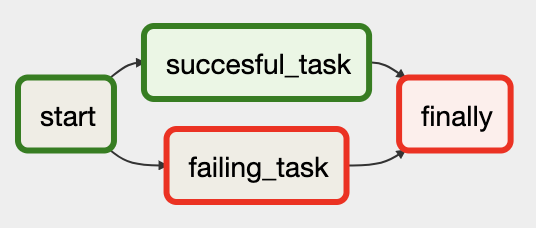I have the following DAG with 3 tasks:
start --> special_task --> end
The task in the middle can succeed or fail, but end must always be executed (imagine this is a task for cleanly closing resources). For that, I used the trigger rule ALL_DONE:
end.trigger_rule = trigger_rule.TriggerRule.ALL_DONE
Using that, end is properly executed if special_task fails. However, since end is the last task and succeeds, the DAG is always marked as SUCCESS.
How can I configure my DAG so that if one of the tasks failed, the whole DAG is marked as FAILED?
Example to reproduce
import datetime
from airflow import DAG
from airflow.operators.bash_operator import BashOperator
from airflow.utils import trigger_rule
dag = DAG(
dag_id='my_dag',
start_date=datetime.datetime.today(),
schedule_interval=None
)
start = BashOperator(
task_id='start',
bash_command='echo start',
dag=dag
)
special_task = BashOperator(
task_id='special_task',
bash_command='exit 1', # force failure
dag=dag
)
end = BashOperator(
task_id='end',
bash_command='echo end',
dag=dag
)
end.trigger_rule = trigger_rule.TriggerRule.ALL_DONE
start.set_downstream(special_task)
special_task.set_downstream(end)
This post seems to be related, but the answer does not suit my needs, since the downstream task end must be executed (hence the mandatory trigger_rule).


on_failure_callbackto get notified about failed task. – Upsideon_failure_callbackto get notified, but I would like my DAG marked asfailedin the Web UI. – Currenspecial_taskI'd expect failure to propagate. It is more of a bandage than a solution though. – Upside